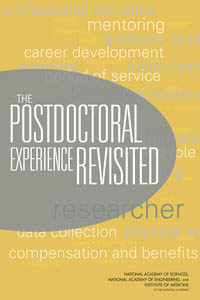Recommendations for improvements in standards, training, compensation supported by SPIE leaders
 BELLINGHAM, Washington, USA -- Inconsistent training, lack of recognition, and limited future professorship opportunities are hurting career prospects for many new PhDs working as postdoc researchers, notes a new report from the U.S. National Academies (NA). At the same time, while the postdoc position is often the assumed next step after one gets a PhD, it may not be the best choice depending on one's career preferences.
BELLINGHAM, Washington, USA -- Inconsistent training, lack of recognition, and limited future professorship opportunities are hurting career prospects for many new PhDs working as postdoc researchers, notes a new report from the U.S. National Academies (NA). At the same time, while the postdoc position is often the assumed next step after one gets a PhD, it may not be the best choice depending on one's career preferences.
The NA report points the way to improving the postdoc experience, and leaders of SPIE, the international society for optics and photonics, are urging support for the report's recommendations.
The report, titled "The Postdoctoral Experience Revisited," emphasizes the long-standing issues of low pay and inconsistent or nonexistent recognition, mentoring, and career development for postdoc researchers, and notes that the position is not essential for all career paths.
"While some science PhDs do eventually move into tenure-track faculty positions, a wide majority across all fields are employed as non-tenured academic researchers or teachers, industrial or government researchers, non-research positions in science, or in non-science positions," said SPIE CEO Eugene Arthurs. "The new NA report emphasizes that reality for those who choose to become postdocs, believing it to be mandatory for the hoped-for academic job."
The data is obvious, Arthurs said. "Most will not get tenure track academic positions. That is not to say that the postdoc experience is not valuable to those like myself who choose to leave academia. I had a great postdoc experience, but I see that today there should be more career consideration for freshly minted PhDs."
The report recommends that:
When the postdoc experience works well, it provide valuable opportunities.
"I was awarded a small contract from industry as Principal Investigator during my first year as postdoc," said Cristina Canavesi, who is the University of Rochester Center Coordinator, NSF/IUCRC Center for Freeform Optics. "I was very surprised to learn that this is highly uncommon at my university. Leading a research project is excellent training for a postdoc and should be encouraged more broadly."
Canavesi also noted that mentoring is often left to personal initiative, a point that was recognized by on both sides of the relationship.
"The most important thing a graduate student can do is approach a postdoc position as a deliberate extension of their training, and start with an individual development plan," said Jennifer Kehlet Barton, Associate Vice President for Research and professor in Biomedical Engineering at the University of Arizona.
NA recommendations for setting standards and maintaining consistency are seen as important steps toward improvements.
"There is a general problem with lack of accountability and consistency in academia as far as research training of graduate students and postdocs go," said Nishant Mohan, a recent postdoc researcher, now Director of Product Management at Wasatch Photonics. "College administrations should create more specific standards in regards to expectations from the research advisers. Both the trainee and the adviser should be on the same page regarding their roles."
SPIE is the international society for optics and photonics, a not-for-profit organization founded in 1955 to advance light-based technologies. The Society serves nearly 235,000 constituents from approximately 155 countries, offering conferences, continuing education, books, journals, and a digital library in support of interdisciplinary information exchange, professional networking, and patent precedent. SPIE provided $3.4 million in support of education and outreach programs in 2014.
Contact:
Amy Nelson
Public Relations Manager
amy@spie.org
<+1 360 685 5478
@SPIEtweets